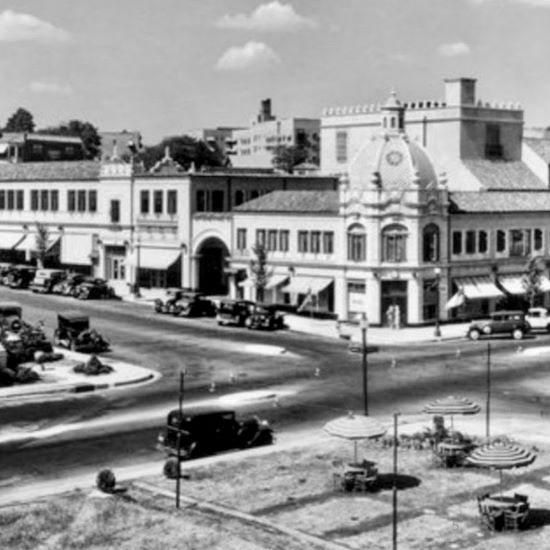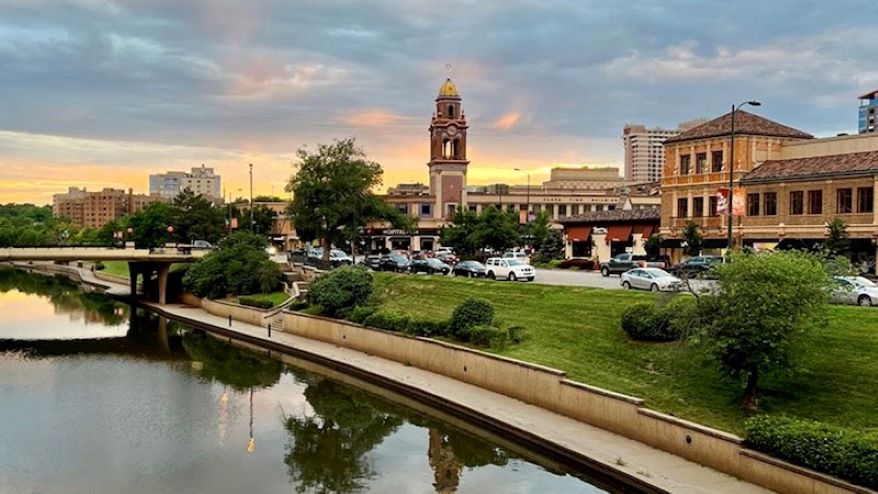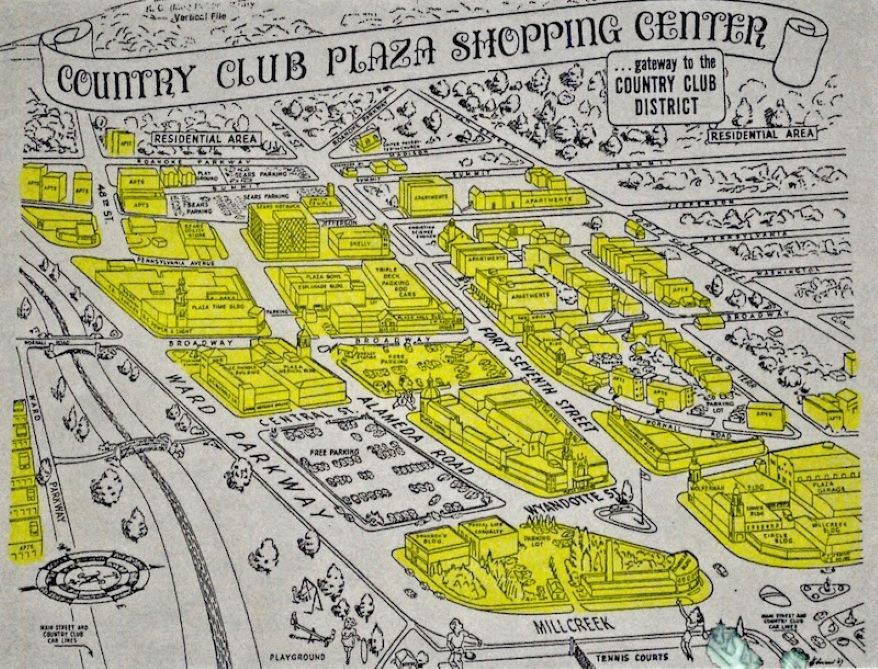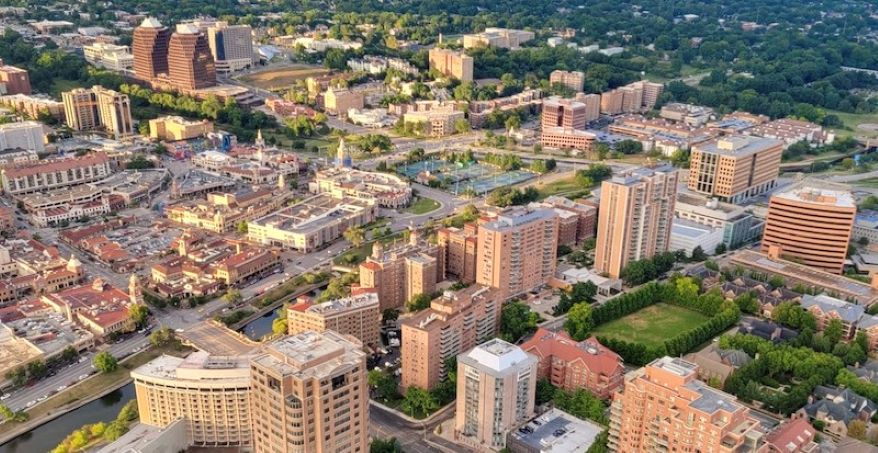Concerned Civic Leaders Form Group to Support the Country Club Plaza Historic Shopping District Marks Centennial in 2023
Published December 5th, 2022 at 6:30 AM
Above image credit: The Country Club Plaza holiday lights. (Courtesy | Visit KC)The Country Club Plaza is celebrating its centennial next year and top civic leaders are laying plans to assure the venerable but frayed landmark enjoys a vibrant second 100 years.
“This isn’t about a sentimental journey to restore the past, but an interest in moving forward to an exciting future,” said David Westbrook, a communications professional involved with the endeavor.
What’s being called the Plaza Area Council wants to bring together constituencies with a strong stake in the Plaza and create a well-funded, nonprofit organization similar to the Downtown Council to work collaboratively on its behalf.
While the Plaza has been the subject of community consternation in recent years with its out-of-town ownership, increased vacancies, some less than stellar tenants and security concerns, Westbrook said that’s not the impetus for the new group.

“This is not a response to a a particular problem,” he said. “Instead, it’s an anticipation of an exciting future. Like the future imagined for downtown Kansas City, we want to bring that imagination to the Plaza.”
The fledgling Plaza Area Council already has attracted interest from a who’s who of civic leaders including Tom McDonnell, Bill Gattreaux, Trey Humphrey, Jonathan Kemper, Grant Burcham, Ken Block, Jon Copaken, David Brain, Bill Zollars and Julian Zugazagoitia.
They were among about 80 people who recently attended a briefing at the Sulgrave condominiums overlooking the Plaza organized by Kate Marshall, president of the South Plaza Neighborhood Association.
Marshall is a leader in the effort to create the group and a member of its steering committee.
While there are other groups already involved with the Plaza — including Historic Kansas City, Save the Plaza and neighborhood organizations — none have the resources and leadership clout envisioned by the Plaza Area Council.
“All those neighborhood groups and special initiatives will have a role, but this is about bringing things to a scale with strong political connections and economic resources,” Westbrook said.
In Marshall’s PowerPoint presentation at the Sulgrave meeting, there were several critical bullet points describing the current state of the Plaza:
- Some new store openings lack the draw and interest of the traditional Plaza retail audience, and short-term leases and vacancies leave long-time visitors and neighborhood resident concerned about the future of the Plaza.
- Locals often comment that there’s “nothing to do” on the Plaza.
- Some developers, who traditionally have sought opportunities in and around the Plaza, are discouraged by unnecessarily long and drawn out fights to get city and neighborhood approval to build.
- Deferred maintenance on hardscapes and landscaping is hampering the Plaza and Brush Creek.
- A rise in crime and assaults, in and around the Plaza, keeps visitors and local residents away.
“Over the last five years, my neighbors have grown increasingly concerned about the Plaza and its future,” Marshall wrote. “That prompted me to investigate.
“What I discovered was a glaring absence of an organization whose sole purpose is sustaining the Plaza as a cultural destination for the city.”
Westbrook said the proposed new Plaza Area Council could be similar to the Downtown Council, an organization of property and business owners that has been instrumental in encouraging and guiding the revitalization that began 20 years ago.
“Residents and retailers have seen what’s gone on … in downtown Kansas City and we’d like to capture that energy to have a dynamic, positive impact on this part of town,” Westbrook said.

The Downtown Council also operates a community improvement district (CID) that provides maintenance and limited security services in the central business district and River Market areas. It’s funded by a special property tax levy on property owners.
A similar CID might be part of what the Plaza Area Council has in mind for the Plaza area.
Westbrook said the proposed association is not intended to challenge the current ownership of the Plaza, a consortium comprised of Simon Property Group of Indianapolis, Macerich Co. of Santa Monica and Taubman Centers of suburban Detroit.
“We intend to be uncontentious and enthusiastically collaborative with Taubman,” he said. “We also want to be the conscious of what we hope the city can receive from the collaboration.”
As for City Hall, Westbrook said, “The city will be involved and we’ll stay in touch, but we don’t want this to be city-driven or developer-driven, it should be a community initiative.”
One of the issues confronting the Plaza these days is what kind of development is appropriate for the district and surrounding area.
Historic KC has expanded beyond its traditional preservation role to lobby for stronger zoning restrictions in the Plaza area, and rival developers are squaring off over projects such as Cocina47.
Westbrook said the proposed Plaza Area Council wants to have an important role in that development discussion.
“We want all significant real estate developers to be at the table so no single developer is perceived to have a special advantage,” he said.
The proposed Plaza Area Council plans to seek funding assistance from philanthropies and foundations and be action oriented.

“We don’t need to employ a big group to do a big study that includes all types of political agendas,” Westbrook said.
“We have plenty of data. We may need to facilitate the existing data to see if new information is needed to determine the most pressing issues going forward.”
In her presentation, Marshall suggested the immediate objective should be to make the Plaza “the best entertainment district in Kansas City” as it celebrates its centennial, and Kansas City hosts the NFL Draft this spring and the World Cup Soccer matches in 2026.
Her recommended to-do list includes keeping its streets and crosswalks safe; maintaining landscaping; repairing streets and sidewalks; ensuring fountains are working; providing clear signage for parking, and creating and maintaining a pedestrian zone.
On the security front, recommendations include increased security patrols at the Plaza, its garages and along Brush Creek; better coordination with city police; policies for the homeless and panhandling, and considering a curfew for unaccompanied youth after 6 p.m.
To make the Plaza more vibrant, she suggests more appealing retailers; more open spaces with movies, concerts and markets; limited street vendors; more outdoor dining places and closed-off streets, and inviting a brewery or distillery.

As for the Plaza’s upcoming 100th anniversary, suggestions include collaborating with Taubman on a celebration; producing a documentary and/or book on its history; staffing a visitor booth, and engaging in a brand strategy initiative.
Besides Marshall, other steering committee members are Tom McGee, a developer formerly with VanTrust Real Estate; Dennis Strait, an architect at Multistudio; Tyler Enders, principal of Made in KC; urban strategist Beth Zollars, and entrepreneur Matthew Mellor.
Westbrook said the Country Club Plaza that the proposed association wants to usher into a new century goes beyond the dozen blocks planned by developer J.C. Nichols that began opening shops in 1923.
“It’s not an area,” he said, “but a geography of influence that stretches into Kansas, downtown and to the east.
“What’s done to bring new energy to the Plaza will also bring it to that area of influence.”
Correction: An earlier version of this story referred to the Plaza Area Council as the Plaza Council Association.
Flatland contributor Kevin Collison is the founder of CityScene KC, an online source for downtown news and issues.


